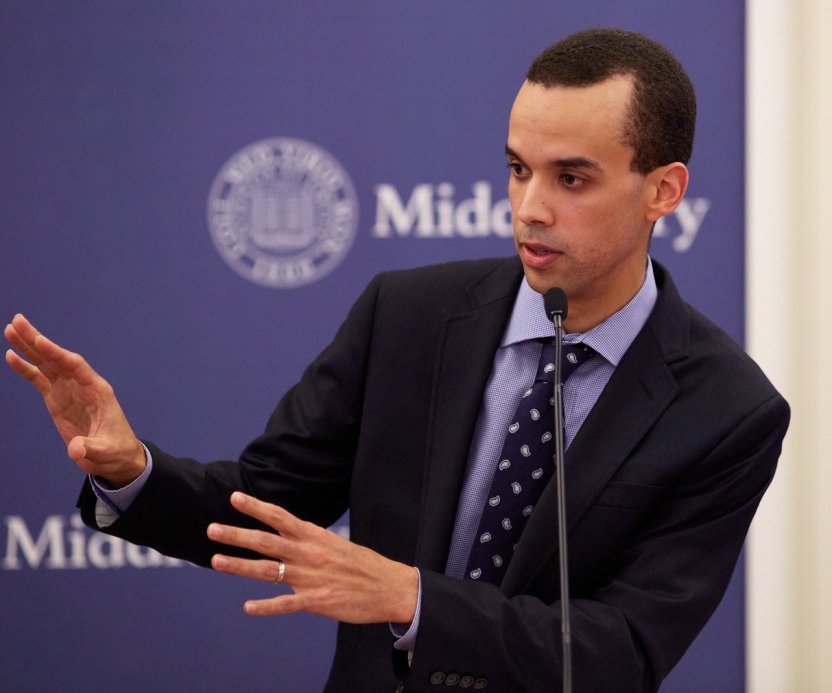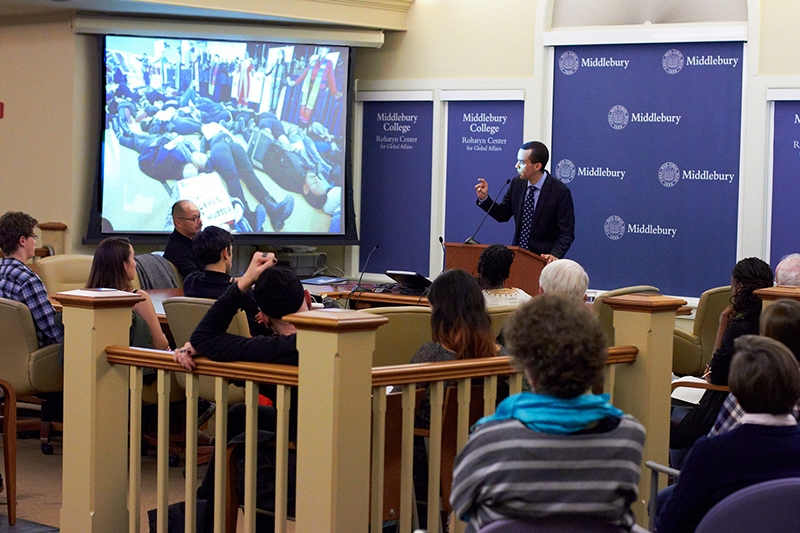Sociologist Speaks to the Issue of 'Black Lives Matter'

MIDDLEBURY, Vt. – In the wake of President Barack Obama’s election in 2008, Michael Jeffries found himself swept up in the optimism washing over the country. The Wellesley College associate professor of American studies didn’t buy pundits’ proclamations that America was “post-racial.” And yet, recalled Jeffries, “I found myself celebrating. … For me, I took the election as a signal that white supremacy was weaker than it had been, and was growing weaker still.”
Shedding this optimism was the topic of Jeffries’s lecture at Middlebury College on Nov. 2. In a talk titled “From Post-racialism to Black Lives Matter: Waking up in the Obama Era,” the qualitative sociologist chronicled the country’s journey from the euphoria following Obama’s election to nationwide riots and protests over police shootings of unarmed black individuals and a renewed debate about civil rights in the United States.
“I bought into the teleological story that post-racialism relies on,” said Jeffries, whose scholarly work focuses on race, gender, politics, identity, and popular culture. “It’s a narrative of progress. It’s a narrative that says our economic, legal, and political machinery exists for the protection of my civil rights, and when I say ‘my’ I’m talking about myself as a black person living in this country.”
For Jeffries, the turning point — the “alarm that woke me up,” as he put it — came in 2012, when George Zimmerman shot and killed Trayvon Martin, an unarmed black teenager, in Florida. The following year, a jury acquitted Zimmerman of second-degree murder and manslaughter.

But Martin wasn’t the only case that shook Jeffries. He listed shootings and instances of police aggression from across the country: Milwaukee, Ohio, New York, Missouri, and Baltimore. These instances took a physiological, emotional toll on individuals like himself, Jeffries said, but also galvanized the Black Lives Matter movement and shed light on structural inequalities in the United States that continue to oppress people of color.
“One of the things that Black Lives Matter has exposed is that knowing isn’t enough,” said Jeffries at the Rohatyn Center for Global Affairs. “Evidence isn’t enough. We can have all of the stories about police brutality and harassment and mass incarceration and employment discrimination and housing discrimination and food deserts in black and brown communities and the school-to-prison pipeline. We can have all this information in front of us, but you need action. You need unrest.”
Standing in front of a projected image of Black Lives Matters activists laying down in protest, Jeffries told his audience, “For those us who have the privilege to go on living as if nothing has happened, it’s important that we recognize the debt we owe to people like this who are laying down in shopping malls, laying down in the street. If we feel we are inconvenienced, or if we feel we are not perfectly aligned with their politics, those feelings need to be secondary at best to gratitude for keeping the kind of life blood of our democracy alive in troubled times.”
– With reporting by Kathryn Flagg ‘08 and photography by Todd Balfour

